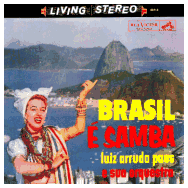 Luiz Arruda Paes "Brasil Noite E Dia" (Odeon, 1957) (LP)
Luiz Arruda Paes "Brasil Noite E Dia" (Odeon, 1957) (LP)
Kitschy, old-fashioned stuff from Sao Paulo-based bandleader Luiz Arruda Paes. Classy though often uptempo orchestrations full of gooey string sections, big brass, flowery harp plucking and lots of bouncy samba percussion, but all very '50s pop-orchestral. If you're looking for a good example of American-style post-big band instrumental pop, played in with a genuine Latin feel, this might be for you. And there may be enough genuine samba in here to satisfy folks into that style as well -- the repertoire includes lots of standards by Atualfo Alves, Ary Barroso, Billy Blanco, Tito Madi, Humberto Teixeira and others. I'm not sure who the musicians were in this ensemble: anyone out there know more?
 Luiz Arruda Paes "Brasil Em Tempo De Danca" (Odeon, 1959) (LP)
Luiz Arruda Paes "Brasil Em Tempo De Danca" (Odeon, 1959) (LP)
 Luiz Arruda Paes "Brasil E Samba" (RCA Victor, 1962) (LP)
Luiz Arruda Paes "Brasil E Samba" (RCA Victor, 1962) (LP)
 Luiz Arruda Paes "Brasil Noite E Dia, v.2" (Odeon, 1966) (LP)
Luiz Arruda Paes "Brasil Noite E Dia, v.2" (Odeon, 1966) (LP)
 Luiz Arruda Paes "Brasil Noite E Dia, v.3" (Odeon, 1969) (LP)
Luiz Arruda Paes "Brasil Noite E Dia, v.3" (Odeon, 1969) (LP)
Zeca Pagodinho - see artist discography
Lauro Paiva "O Ritmo E..." (Paladium) (LP)
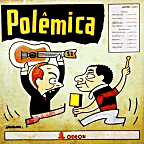 Roberto Paiva "Os Idolos Do Radio" (Collectors Editora, 1956-?) (LP)
Roberto Paiva "Os Idolos Do Radio" (Collectors Editora, 1956-?) (LP)
 Roberto Paiva & Francisco Egydio "Polemica Noel Rosa & Wilson Baptista" (Odeon, 1956) (LP)
Roberto Paiva & Francisco Egydio "Polemica Noel Rosa & Wilson Baptista" (Odeon, 1956) (LP)
A fun old 10" album with a cool back-story. Latter-day samba crooners Francisco Egydio and Roberto Paiva recreate the good-natured rivalry between samba-cancao songwriters Wilson Baptista and Noel Rosa, who once upon a time wrote a series of songs jabbing at each other in a public "polemica," a sort of duel of songs that lasted several years and produced several samba classics in the 1930s. These 1950s performances are a little bit on the stuffy side -- Brazilian music had formalized and slowed down a bit from the heyday of the samba-cancao scene, but it's still a classy set. A nice slice of old-school samba history.
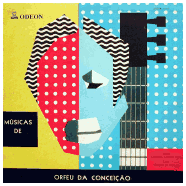 Roberto Paiva/Luiz Bonfa/Vinicius De Moraes "Musicas De Orfeu Da Conceicao" (Odeon, 1956) (LP)
Roberto Paiva/Luiz Bonfa/Vinicius De Moraes "Musicas De Orfeu Da Conceicao" (Odeon, 1956) (LP)
A brief EP that documents the historic stage show of the fabled Orfeu play, which was a touchstone in the creation of bossa nova... It's a pretty rough mix of stagey orchestral themes, poet Vinicius De Moraes intoning sections of the libretto, and a somewhat shrill chorus singing a few songs... Some of the melodies will be familiar to fans of the Black Orpheus soundtrack, but these early versions are rather crude in comparison to the later studio recordings. It's also a very brief disc -- less than twenty minutes long. An important relic of the growth of bossa nova, but not a very satisfying or compelling record. Apparently guitarist Luiz Bonfa plays on this album -- and added material as a composer -- although his performances are obscured in the murky sound mix.
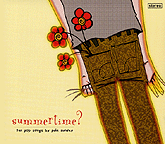 Pale Sunday "Summertime...?" (Matinee Records, 2005)
Pale Sunday "Summertime...?" (Matinee Records, 2005)
Dreamy, jangly indie-pop from this Sao Paulo-based band... Singing mostly in English (with the exception of one song, titled "1978"), these guys flawlessly emulate their models, namely the mopey, wistful '80s British twee-poppers of the Sarah label variety, and numerous lo-fi janglecore bands from the USA... They have the sound down to a "T", though if you know what to listen for, you can pick out their cute Brazilian accents and doubtless find it quite charming. Personally, I wish they'd sung more numbers in Portuguese, 'cuz I like that sort of thing from "foreign" bands, but it's still cool to find such a competent indie band coming out of Brazil... There are precious few, as far as I can tell... If you like cute, introspective guitar-pop bands with mopey, solipsistic lyrics -- indeed, any other bands on the Matinee label -- then check these guys out. They know what they're doing.
 Pale Sunday "A Weekend With Jane" (EP) (Matinee Records, 2003)
Pale Sunday "A Weekend With Jane" (EP) (Matinee Records, 2003)
Pale Sunday "Shooting Star" (EP) (Matinee, 2010)
Palmeira & Piraci "Caboclinho Apaixonado" (Revivendo, 2002)
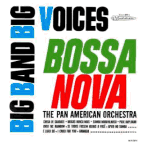 The Pan American Orchestra "Big Band Big Voices Bossa Nova" (Musidisc, 1963) (LP)
The Pan American Orchestra "Big Band Big Voices Bossa Nova" (Musidisc, 1963) (LP)
A lot of Jobim, some Ary Barosso, a couple of North American standards -- "Over The Rainbow" and "I Cried For You" -- and a sprinkle of pan-Americana (a tune by Augustin Lara, etc.) all played by an anonymous studio band... Anyone know more about these guys?
Lyrio Panicali - see artist discography
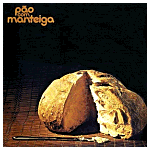 Pao Com Manteiga "Pao Com Manteiga" (Continental, 1976) (LP)
Pao Com Manteiga "Pao Com Manteiga" (Continental, 1976) (LP)
Downtempo '70s prog, with a wispy, cosmic, stargazing vibe. Lazy, chunky electric guitars, kooky, irritating vocals. Reminds me of Rita Lee's Tutti Frutti stuff, with less of a spasmodic, rock'n'roll drive... But the hippie harmonies are the same. I guess this is kind of interesting, though it's not really my scene. Authentic, yes... Captivating? Ummm... Guess it depends on your perspective.
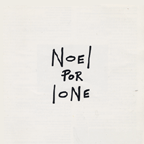 Ione Papas "Noel Por Ione" (Dabliu, 2000)
Ione Papas "Noel Por Ione" (Dabliu, 2000)
A solid modern tribute to Noel Rosa, one of the great early songwriters of the classic samba cancao era of the Great Depression. Papas glides atop sleek, bright, catchy MPB arrangements, reminiscent (and on a par with) the best work by Gal Costa and Elis Regina. The cover art's a bit "blah," but the record's certainly worth checking out!
Ione Papas "Na Linha Do Samba" (Dabliu, 2008)
Papete - see artist discography
Joao Parahyba "The New Lambadas" (YB, 1992)
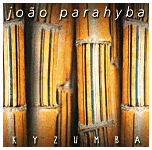 Joao Parahyba "Kyzumba" (YB, 1994)
Joao Parahyba "Kyzumba" (YB, 1994)
World music-y jazz/instrumental music from percussionist Joao Parahyba, of the fabled Trio Mocoto. This isn't quite my cup of tea -- a little too gooey overall -- but there's some cool stuff here, drawing on many sources, not just Brazilian music, but also tango and a touch of electronic/ambient music as well. If you're on the more adventurous side of the "smooth jazz" style, you might want to check this out.
Os Paralamas Do Sucesso - see artist discography
Rosa Pardini "Rosa Pardini" (Polydor, 1956)
Rosa Pardini "Eu, O Luar E Voce" (RCA Victor, 1958) (LP)
Hermeto Pascoal - see artist discography
Rosa Passos - see artist discography
Pato Fu - see artist discography
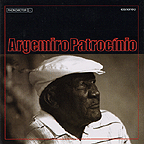 Argemiro Patrocinio "Argemiro Patrocinio" (EMI/Phonomotor, 2002)
Argemiro Patrocinio "Argemiro Patrocinio" (EMI/Phonomotor, 2002)
Samba composer Argemiro Patrocinio, an elder member of the Portela samba school's velha guarda, is celebrated and spotlighted on this beautiful, reverential album, which features affectionate contributions by MPB and samba stars such as Zeca Pagodinho, Jaques Morelenbaum, and Moreno Veloso. Pop star Marisa Monte is the driving force behind this project, but while she bankrolled the record, Monte remains in the background, singing on only a couple of songs, content merely to document, not to dominate. All the songs were written or co-written by Argemiro over his decades-long career, and are performed with a delicious, delicate delivery, marked by lovely instrumental efforts which perfectly frame his gentle, soulful vocals. A lovely record; if you enjoyed the Velha Guarda da Portela album that came out a couple of years earlier, then you should definitely track this one down as well.
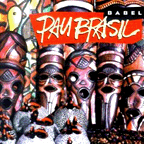 Pau Brasil "Babel" (Blue Jackel Records, 1995)
Pau Brasil "Babel" (Blue Jackel Records, 1995)
An old-fashioned jazz-fusion group, featuring bassist Rodolfo Stroeder and vocalist Marlui Miranda. Sounds a LOT like old Chick Corea, Return To Forever, etc. Distinctively Brazilian elements include compositions based on indigenous tribal music -- a theme which is explored better on Miranda's solo albums. My aversion to the soprano saxophone is one of the reasons I found this record hard to get into.
Pau Brasil "2005: 25 Anos Do Melhor Jazz Brasileiro" (Pau Brasil, 2005)
Pau Brasil "Pau Brasil" (2007)
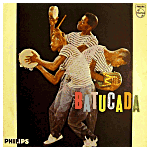 Paulinho & Pacifico Mascarenhas "Um Passeio Musical" (Guarani, 1958) (LP)
Paulinho & Pacifico Mascarenhas "Um Passeio Musical" (Guarani, 1958) (LP)
 Paulinho E Sua Bateria "Paulinho Baterista - Batucada" (Philips, 1961) (LP)
Paulinho E Sua Bateria "Paulinho Baterista - Batucada" (Philips, 1961) (LP)
Nice batucada percussion set from the old days... A surprisingly rootsy album for a major-label release, with stripped-down production framing surdo, agogo and other instruments typical from the street samba style... On various tracks they throw on a little echo and add some brass or flutes or guitar, but underneath it all this is the real deal. Neat stuff.
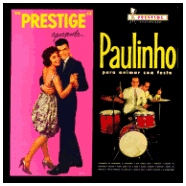 Paulinho & Seu Conjunto "Para Animar Sua Festa" (Prestige, 1959) (LP)
Paulinho & Seu Conjunto "Para Animar Sua Festa" (Prestige, 1959) (LP)
Brazilian drummer Paulo Fernando de Margalhes led a tight jazz combo as a hotel band in Mexico, and the (non-Brazilian) Latin-dance influence is pretty strong on this album, with Cuban-style dance music a predominant part of the mix. This album features four long medleys, and it isn't until the last three minutes of the last track that he breaks out into a straightforward samba rhythm. Nonetheless, this is a pretty strong set, one of the more solid Brazilian jazz albums you'll hear of this vintage. Definitely worth a spin. (Unfortunately there's no info on who was in his band... Anyone out there know more?)
Paulinho & Seu Conjunto "Para Animar Sua Festa, v.2" (Prestige, 1959)
Paulinho & Seu Conjunto "Para Animar Sua Festa, v.3" (Prestige, 1960)
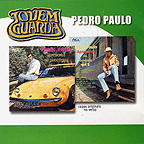 Pedro Paulo "Apresenta Os Sucessos" (Columbia/OKeh, 1969) (LP)
Pedro Paulo "Apresenta Os Sucessos" (Columbia/OKeh, 1969) (LP)
Soft rocker Pedro Paulo kind of picked up where Roberto Carlos left off -- as Carlos drifted towards his iconic status as a Spanish-language crooner, Paulo kept singing old-fashioned teenybopper pop tunes. Considering when these albums actually came out, they were hopelessly out of fashion, but if you just take them for what they are and compare them to Carlos's rather similar releases from 1962-66, Paulo's work holds up pretty well. He was more consistently uptempo and "rocking" than Carlos, and recorded fewer American pop covers. On the second album, he gets a little more modern, opening the disc with "Maria Helena," a funky original by Brazilian soul singer, Hyldon Souza. Yeah, sure, it's mainly pretty wimpy stuff, but for the JG scene, this ain't bad. (Reissued along with Volume Two in 1999 as a 2-CD set.)
Pedro Paulo "Apresenta Os Sucessos, v.2" (Columbia/OKeh, 1970) (LP)
Pavilhao 9 - see artist discography
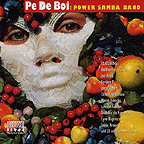 Pe De Boi "Power Samba Band" (Arkadia, 1998)
Pe De Boi "Power Samba Band" (Arkadia, 1998)
The lone album by this long-lived New York City samba-jazz band, formed in 1980 by percussionist Guilherme Franco, a veteran of the McCoy Tyner band... Plenty of guest performers on here, notably Cyro Baptista, Jorge Dalto, and a whole slew of Franco's friends in New York's Brazilian expatriate community. A skillful, well-realized and substantive mix of samba, modern jazz fusion, and a dash of NY-style salsa... It's too far into the "jazz" camp for my tastes, but I can definitely recognize that it's a high-quality performance, and that Franco didn't really sacrifice anything from any of the elements he's drawn on: the composition and playing is solid throughout.
Cauby Peixoto - see artist discography
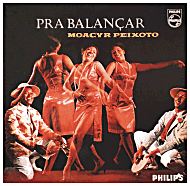 Moacyr Peixoto "Pra Balancar" (Philips, 1964) (LP)
Moacyr Peixoto "Pra Balancar" (Philips, 1964) (LP)
(Produced by Alberto Borba & Rogerio Gauss)
Swinging easy-listening bossa-nova featuring pianist Moacyr Peixoto with a lively, expressive backing band, including an occasional vocal chorus. Peixoto, who was apparently Cauby Peixoto's brother, fits nicely into the spectrum of Brazilian nightclub pianists: his style is generally bouncy and upbeat, less sly than Fats Elpidio, less self-mocking than Leal Brito, less aggressive than most of the "bossa trio" jazz players. The album starts off with a sleek vocal tune, "Amor E Paz," which features a bright chorus along the line of early MPB-4, but this turns out to be misleading, as the rest of the record is mainly all-instrumental, and may lapse into tedium, depending on your affinity for the style. The performances are pretty engaging, though -- they weren't just going through the motions, and the repertoire includes material by up-and-coming composers such as Ronaldo Boscoli, Ed Lincoln, Durival Ferreira, and Syvio Cezar, along with some oldies by Caymmi, et.al. Definitely worth a spin.
Moacyr Peixoto "Um Piano Dentro Da Noite" (Eldorado, 19--?)
Diana Pequeno - see artist discography
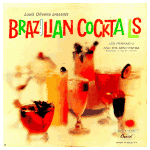 Leo Peracchi E Sua Orquestra "Brazilian Cocktails" (Capitol, 1958) (LP)
Leo Peracchi E Sua Orquestra "Brazilian Cocktails" (Capitol, 1958) (LP)
An amazingly over-the-top pop-orchestral album with a funny "concept": the songs are named after fictitious cocktail drinks like the "Dry Copacabana" or "Latin Manhattan," or they have punny, lil' drinkie-winkie related names like "Souse America." This includes a few early Tom Jobim compositions that weren't folded into his standard canon (listen to this record, and you'll probably see why...) as well as a number of other little-known tunes by other top-flight composers such as Luiz Bonfa, Vadico, Joao da Bahiana and Lindolfo Gaya. The orchestrations are insanely baroque and overly assertive, with dancing pizzicato strings, velvet brass and gooey piano and then -- BANG!! -- tons of rhythmic punch. It's a very ridiculous record, more North American "hi-fi" than Brazilian semi-samba, but lounge fans who go for the really silly stuff will love it.
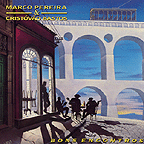 Marco Pereira & Cristovao Bastos "Bons Encontros" (Caju/Milestone Records, 1992)
Marco Pereira & Cristovao Bastos "Bons Encontros" (Caju/Milestone Records, 1992)
Guitarist Pereira and pianist Bastos dance through a nice set of instrumental duets, exploring the compositions of Dorival Caymmi and Noel Rosa. It's a little on the lite-jazz side, but basically it's pretty engaging. Good for the genre, at any rate. They have light accompaniment on a few tunes, but mostly this is just the two of them together and they seem to have a lot of chemistry in their playing. Worth checking out.
Marco Pereira "Elegia: Virtuoso Guitar Music From Brasil" (Channel Classics, 1994)
Marco Pereira "Cameristico" (Biscoito Fino, 2007)
Nazare Pereira - see artist discography
Osvaldo Pereira "Ohla Ze" (Rob Digital, 2001)
Osvaldo Pereira "As Arvores" (Dubas, 2005)
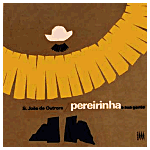 Pereirinha E Sua Gente "Sao Joao De Outrora" (Equipe, 1967)
Pereirinha E Sua Gente "Sao Joao De Outrora" (Equipe, 1967)
A doubtless authentic, yet sort of underwhelming, set of accordion-based music with a bit more of the old-school polka in it than, say a baiao or forro set by Luiz Gonzaga, et. al. This disc starts out with a little bit of band chatter, guys going hoo, hayy, haah and "sarava!"-ing up a storm. But the bonhomie feels forced and awkward, and when they settle down and just play their music, it gets kind of monotonous. For diehard students of regional northeastern dance music, this might be a find... But for the average listener? Maybe not so much.
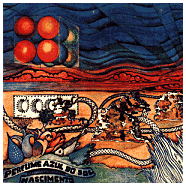 Perfume Azul Do Sol "Nascimento" (Chantecler, 1974)
Perfume Azul Do Sol "Nascimento" (Chantecler, 1974)
Psychedelic heavy/hippie rock straight from the tropicalia playbook: fans of Novos Baianos or Gal Costa's rock records of 1969-71 will get a kick out of this Sao Paulo-based band which featured a female vocalist named Ana, as well as a couple of prog-psych vets from bands such as Som Nosso Cada Dia and Os Incriveis... It's a decent record which seems thrilling when it starts out, but falls a little flat after a few tunes; they're authentic and up to date, doing the same stuff as the other bands, but they don't quite have the propulsive spark to make this the kind of record that'll really wow you. Still, students of Brazilian rock will definitely want to check this out.
Perla "...Canta ABBA E Outros Hits" (Sony, 2002)
Perla "Grandes Sucessos" (Sony, 2003)
 Perla "Maxximum" (Sony, 2005)
Perla "Maxximum" (Sony, 2005)
Absolutely dreadful romantic ballads in the Latin American bolero tradition, sung in both Portuguese and Spanish. This best-of set opens with a translated version of ABBA's "Fernando," and gets worse from there. Dunno much about this Paraguayan-born, Brazil-raised artist, but I kinda feel like I don't have to.
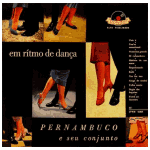 Pernambuco & Seu Conjunto "Em Ritmo De Danca" (Polydor, 1957) (LP)
Pernambuco & Seu Conjunto "Em Ritmo De Danca" (Polydor, 1957) (LP)
Not to be confused with '50s samba percussionist Pernambuco Do Pandeiro, jazz trumpeter Ayres da Costa Pessoa (aka Pernambuco) was apparently the brother of pianist Fats Elpidio and accompanied him into the jazz/gafieria field. This is a jovial, pre-bossa dance album featuring lively percussion, piano and flute -- some songs are a little cloying or lethargic, but others are fun, in a decidedly kitschy kind of way. If you enjoy similar artists of this era -- Elpidio, Zaccharias, Trio Surdina -- this is worth checking out as well.
 Pernambuco & Seu Conjunto "Conversando Com O Piston" (Polydor, 1959) (LP)
Pernambuco & Seu Conjunto "Conversando Com O Piston" (Polydor, 1959) (LP)
Jovelina Perola Negra - see artist discography
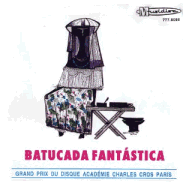 Luciano Perrone "Batucada Fantastica" (Musidisc, 1963) (LP)
Luciano Perrone "Batucada Fantastica" (Musidisc, 1963) (LP)
Drummer Luciano Perrone (1908-2001) is famous for being the first recording artist to use snare drums for samba music -- his legacy goes way, way, way back into the roots of Brazilian popular music -- in the 1930s, he was in a trio with pianist Radames Gnattali, with whom he collaborated for many years; throughout the '40s and '50s he played in countless sessions and bands, and beginning in the '60s he recorded three albums of batucada drumming that have attained legendary status among fans of the style.
Luciano Perrone "Batucada Fantastica, v.2" (Musidisc, 1967) (LP)
Luciano Perrone "Batucada Fantastica, v.3" (Musidisc, 1972) (LP)
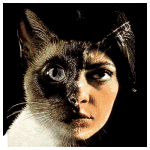 Persona "Som" (1975)
Persona "Som" (1975)
Wanky Brazilian lo-fi hippie-prog, with lots of kooky, spaced-out guitar noodling and ineffective "drumming" as the primary accompaniment. This band featured lead guitarist Luis Sergio Carlini and percussionist Franklin Paolillo, later of Rita Lee's post-Mutantes backup band, Tutti Frutti. This self-released record probably seemed a lot cooler when they were high on whatever they were high on, and I suppose it's a fascinating historical relic, etc. etc., but it's really pretty bad music. It doesn't really hold up well, no matter how rare it was.
 Lina Pesce "Concerto Em Ritmo" (CBS, 1963)
Lina Pesce "Concerto Em Ritmo" (CBS, 1963)
Lush, playfully bombastic renditions of various classical themes -- pieces by Chopin, Liszt, Rachmaninoff, Tchachovski, etc. -- with gratuitously lush piano playing from classical prodigy Lina Pesce, who submits herself to a goofy popping-up courtesy of arranger/orchestra leader Lyio Panicali. This is all very kitschy and lighthearted -- the liner notes proclaim Pesce a classical composer and performer of great note, but you'd be hard pressed to discern that from this cheesy outing. Whiff of pop, rock and a teensy bit of samba may make this noteworthy to easy listening, etc., but it didn't stick to my ribs.
Clara Petraglia "Songs From Brazil" (Sinter/Westminster Records, 1956)
Clara Petraglia "Songs Of Brazil: Clara Petraglia Accompanying Herself On The Guitar" (Sinter/Westminster Records, 1958)
Stripped-down, slightly prissy acoustic versions of classic songs in a variety of antiquated styles, including the batuque, chula, coco, lundu and modinha. Possessed of a sweet, piercing voice, Clara Petraglia tackles the material in a very earnest and forthright manner -- it's a bit like if Joan Baez had been from Bahia, rather than Staten Island. Perhaps not as visceral as the old records from the 1920s and '30s, but effective nonetheless... a nice focus on the lyrics. Also, her guitar playing is quite lovely. This album has been reissued in a variety of pressings, and was first released in the United States back in the 1950s, contemporaneous to its release in Brazil.
 Pierre "2 + 2" (Chantecler, 1965) (LP)
Pierre "2 + 2" (Chantecler, 1965) (LP)
Nice record: very mellow bossa nova guitar with gentle flute, drums and bass, and an almost imperceptible piano in the background. Guitarist Orlando Pierre is an unknown to me, though I do wonder if the "Laercio" credited on piano could be Laercio de Freitas, who emerged as a soul-jazz composer in the '70s. Anyone know more about these folks? No? Oh, well. It's still a sweet set of classic-sounding bossa instrumentals.
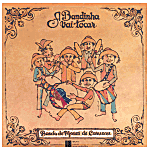 Pifanos De Caruaru "A Bandinha Vai Tocar" (Discos Marcus Pereira, 1980) (LP)
Pifanos De Caruaru "A Bandinha Vai Tocar" (Discos Marcus Pereira, 1980) (LP)
One of the more striking, unique sounds of the Brazilian northwest... the combination of clattering tinny percussion and the arresting sound of the native flutes, known as "flautas de taboca" (or "pifes") should turn your head. Beautifully recorded and fascinating, even if the tracks all start to sound the same after a while. Gilberto Gil recorded with this group in the early '70s.
Pifanos De Caruaru "Isso Tudo E Sao Joao" (Trama Records, 2002)
Pifanos De Caruaru "No Seculo XXI, No Patio Do Forro" (Trama Records, 2004)
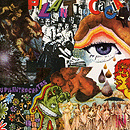 Os Pilantrocratas "Pilantrocracia" (Equipe, 1969) (LP)
Os Pilantrocratas "Pilantrocracia" (Equipe, 1969) (LP)
Jazzmen Paulo Moura, Wagner Tiso, J. T. Meirelles and others collaborate on this sprightly, groove-laden, hippie-era EZ freakout album, recalling some of the bright, perky bounciness of Brazilian soul-pop pioneer Wilson Simonal. The psychedelic art collage and glowing liner notes (both from the original release and the modern reissue) seek to link the Pilantocratas (Portuguese for "pirates") to the ethos of cultural "cannibalism" extolled by the rock-oriented tropicalia movement. However, this goofy, lighthearted set is hardly as challenging or "out there" as the artwork implies. In fact, the album's breezy melodic motifs will seem pretty familiar to aficianados of West Coast "sunshine pop" and instrumental easy listening, albeit with a slightly stronger jazz foundation. But for easy listening/loungecore fans, this disc is definitely a real find. Also of note is the presence of saxophonist Oderdan Margalhes, later a founding member of the disco-y Banda Black Rio, one of the best-known bands in the "Black Rio" soul scene.
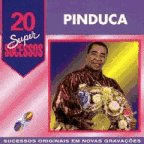 Pinduca "20 Super Sucessos" (Polydisc, 1999)
Pinduca "20 Super Sucessos" (Polydisc, 1999)
I'm afraid that this disc -- late-edition re-recordings of earlier hits -- is a poor representation of Pinduca's music... The leading exponent of the "carimbo," a manic regional style that incorporated Caribbean rhythms into Brazilian dance music, Pinduca started his career in the 1950s, but didn't start recording until the early 1970s. As the style's progenitor, he had a considerable impact on regional pop in Salvador and elsewhere. He is widely considered the creator of the lambada, a popular dance style that peaked in the 1980s, albeit in a rather mindless, glossy pop form. The prefab monotony of that scene is echoed here, with cheesy, uninspired synth riffs and a female chorus that makes every song sounds the same. Although Pinduca can eventually win you over with his sheer exuberance, I have a feeling his older recordings are much more interesting. This is okay, but not great.
 Pinduca "Raizes Nordestinas" (Polydisc, 1999)
Pinduca "Raizes Nordestinas" (Polydisc, 1999)
Andrea Pinheiro "Fiz Da Vida Uma Cancao" (2001)
An homage to songwriter Waldemar Henrique, the first solo album from the lead singer of the Amazonia Jazz Band...
Andrea Pinheiro & Galo Preto "Diz Que Fui Por Ai" (2004)
Leila Pinheiro - see artist discography
Paulo Cesar Pinheiro - see artist discography
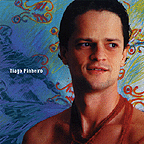 Tiago Pinheiro "Tiago Pinheiro" (Dabliu, 1999)
Tiago Pinheiro "Tiago Pinheiro" (Dabliu, 1999)
Classic jazz-tinged MPB after the style of Edu Lobo, Chico Buarque, Aldir Blanc and the '70s generation of bossa-pop ballad singers. Vocalist Pinheiro threads his way through MPB tunes by Moraes Moreira, Milton Nascimento and Caetano Veloso, alongside several older songs in the public domain, as well as an oldie from Luiz Gonzaga. Pinheiro seems primarily to be a jazz-ish song stylist, although he does contibute one original composition, "Ceu." Marlui Miranda joins Pinheiro on a duet of Elomar's "O Violeiro.." If you like old-style MPB, you might really dig this disc.
Irany Pinto/Jose Menezes/Moacyr Silva/Sivuca "4 Azes Em Hi-Fi" (Copacabana, 1959) (LP)
A sampler of four Brazilian easy-listening/jazz/instrumental artists of the 1950s, including saxophonist Moacyr Silva and violinist and bandleader Irany Pinto... Presumably a sampler of other releases on the Copacabana label...
Irany Pinto "Meus Amores..." (Copacabana, 19--?) (LP)
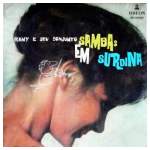 Irany Pinto "Sambas Em Surdina" (EMI-Odeon, 1959) (LP)
Irany Pinto "Sambas Em Surdina" (EMI-Odeon, 1959) (LP)
Fairly sedate, cheesy instrumental recordings, featuring violinist Irany Pinto, playing in a romantic style with a decidedly European/Romany flavor. Not really my cup of tea; the repertoire includes classic samba-cancao songs by Noel Rosa, Herivelto Martins and others -- there's also a glimmer of more modern composers, with a track each from Tom Jobim and Maysa Matarosso. All the songs more or less sound the same, though, transmuted into the same syrupy, overripe melodicism. Perhaps of interest to the easy listening crowd? (By the way, anyone know if Irany was related to jovem guarda rock'n'roll songwriter Rossini Pinto? Seems likely, but I can't say for sure...)
Irany Pinto "Toca Blues Em Surdina, v.1" (EMI-Odeon, 1960)
Irany Pinto "Boleros Em Surdina, v.1" (EMI-Odeon, 1957) (LP)
Irany Pinto "Boleros Em Surdina, v.2" (EMI-Odeon)
Irany Pinto "Boleros Em Surdina, v.3" (EMI-Odeon)
Irany Pinto "Boleros Em Surdina, v.4" (EMI-Odeon)
Irany Pinto "Boleros Em Surdina, v.5" (EMI-Odeon)
Irany Pinto "Boleros Em Surdina, v.6" (EMI-Odeon, 1963)
Irany Pinto "Boleros Em Surdina, v.7" (EMI-Odeon)
Irany Pinto "Boleros Em Surdina, v.8" (EMI-Odeon)
Irany Pinto "Boleros Em Surdina, v.9" (EMI-Odeon)
Irany Pinto "Boleros Em Surdina, v.10" (EMI-Odeon)
Irany Pinto "Boleros Em Surdina, v.11" (EMI-Odeon)
Irany Pinto "Boleros Em Surdina, v.12" (EMI-Odeon, 1969)
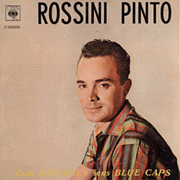 Rossini Pinto "Rossini Pinto" (CBS, 1964) (LP)
Rossini Pinto "Rossini Pinto" (CBS, 1964) (LP)
Pop composer Rossini Pinto was one of the major players in the teen-oriented 1960s jovem guarda pop-rock boom; as a songwriter, producer and lyric translator, his imprint was all over the work of all the other artists in the scene, with versions recorded by Jerry Adriani, Roberto Carlos, The Fevers and The Golden Boys, to name a few. I don't think he really got a fair shake as a performer, though, as this was his only solo album in a decades-long career. Having come to this album after hearing dozens of drab and perfunctory JG rock runthroughs, I have to say I was really impressed. Backing Rossini up here were Renato E Seus Blue-Caps, one of the best-known JG bands, and they give one of their liveliest, jangliest performances -- what I really like, though, are Rossini's vocals. He has an imperfect voice and an offhand delivery that I find quite appealing; there's an imperceptible roughness that's almost like American hillbilly music, a lack of polish that makes him sound refreshingly human. Plus, what a swell set of tunes! Although the JG scene was awash with saccharine, slurpy pop ballads, Pinto tilted towards bouncy, upbeat material. There are a couple of cover tunes on here -- most notably "His Latest Flame," which kicks the album off -- but most of the songs are Rossini originals, and most of them are pretty fun. For my money, this album is way cooler than many of the better-known jovem guarda discs -- it's got more grit and more pep to it than most. Definitely worth checking out!
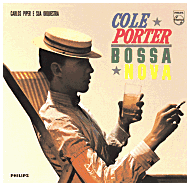 Carlos Piper "Cole Porter Bossa Nova" (Philips, 1963) (LP)
Carlos Piper "Cole Porter Bossa Nova" (Philips, 1963) (LP)
An early album by easy instrumentalist Carlos Piper... This is -- as the album title implies -- a mellow set of Cole Porter classics done up bossa nova style. It's kind of standard issue stuff, competent but uninspired, pretty much what you would have got from a not-too-swinging nightclub band of the early '60s era. This is okay, but not something you have to knock yourself out to track down, in my humble opinion.
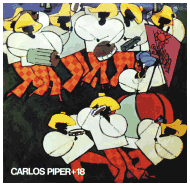 Carlos Piper "+18" (Chantacler, 1973) (LP)
Carlos Piper "+18" (Chantacler, 1973) (LP)
Although the album art makes this look like one of those super-killer early-'70s partido alto samba records, this is mostly just more brassy pop-orchestral cheese. Yes, there are some serious percussionists and sambistas playing in the background, but they're overshadowed by the piercing, bombastic horn section, the same sort of faux-hip, big-bland instrumental ensembles that were around in Europe and America at the same time -- Doc Severinsen and whatnot. Doesn't do much for me, and the samba elements never assert themselves enough to make this work. It's all very crowded and overly-forceful... Oh, well.
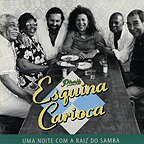 Piraja Esquina Carioca "Uma Noite Com A Raiz Do Samba 0 Ao Vivo" (Dabliu, 2000)
Piraja Esquina Carioca "Uma Noite Com A Raiz Do Samba 0 Ao Vivo" (Dabliu, 2000)
(Produced by Moacyr Luz)
A gorgeous live samba album! It wouldn't be unfair to compare this fab acoustic ensemble to Cuba's much-beloved Buena Vista Social Club -- although this particular group of sambistas, including Beth Carvalho, Joao Nogueira and Dona Ivone Lara never found their fame eclipsed in the same way that the Cuban old-timers did, and they didn't need Ry Cooder to gather their forces together. Still, this is a loving, lively tribute to the old days, and it's done by a bunch of veteran performers who really know their stuff. Every time Carvalho gives a little shout-out to encourage the band, she sounds so joyful that you can't help but smile. Great stuff. Highly recommended!
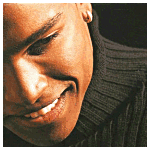 Alexandre Pires "Alexandre Pires" (BMG/RCA, 2001)
Alexandre Pires "Alexandre Pires" (BMG/RCA, 2001)
Dreadful, N'Sync-ish boy-band pop from a former member of So Pra Contrar, cast here as a Brazilian Ricky Martin. Plus, he's singing en espanol... Boo, hiss. Icky.
Djalma Pires "Os Sucessos" (Beverly, 1971) (LP)
Djalma Pires "Sucesso Tranquilo" (RGE, 1971) (LP)
(Produced by Luiz Mocarazel)
Djalma Pires "O Tempo Passa... O Samba Fica" (RGE, 1973) (LP)
Djalma Pires "Djalma Pires" (Chantecler, 1979) (LP)
Djalma Pires "Greve De Amor" (JWC, 1991) (LP)
Ernesto Pires "Novos Quilombos" (Rob Digital, 2000)
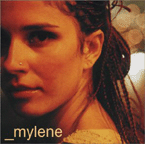 Mylene Pires "Mylene" (Fast Horse Records, 2003)
Mylene Pires "Mylene" (Fast Horse Records, 2003)
(Produced by Ramiro Musotto)
A beautiful album, merging modern Brazilian electronica with sumptuous, soft pop balladry... Anyone who's impatient waiting for Bebel Gilberto to come out with a new album owes it to themselves to check this disc out. Pires shares a similarly eclectic, modern approach, and may even have a more nuanced, far-reaching (if less overtly dynamic) sound than the widely-renowned Bebel G. Percussionist Ramiro Musotto mans the board as producer, and compliments Mylene's laidback style with wispy samples and snippets that don't seem intrusive or cliched... The only weak moment is on a cover of the Beatles tune, "Eleanor Rigby," which pulls us out of the trance-y vibe set by the rest of the record... But as musical sins go, this is a pretty minor misstep. All in all, this is a lovely release, well worth checking out.
Mylene Pires "O Que E Que Ha?" (MCD, 2005)
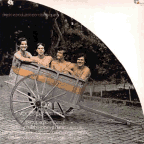 Piri "Voces Querem Mate?" (Quartin 1970) (LP)
Piri "Voces Querem Mate?" (Quartin 1970) (LP)
One of the scant few releases on Roberto Quartin's short-lived indie jazz label. Breezy, jaunty, amorphous free-jazz, with light percussion, piano, a goofy, scatting vocal chorus, and a lot of flute. It's fairly slight stuff, in my estimation, but ripe for discovery by the loungecore-ish among us. Similar in spirit and feel to early Egberto Gismonti... On board are vocalist Danilo Caymmi, Wilson Das Neves on drums, a young Paulo Jobim (flute), Jorge Marinho (bass), and other sundry jazz players, as well as some additional vocals by Tita. Not mindblowing, but nice and innocent.
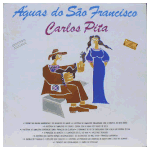 Carlos Pita "Aguas Do Sao Francisco" (Chantacler, 1979) (LP)
Carlos Pita "Aguas Do Sao Francisco" (Chantacler, 1979) (LP)
(Produced by Luiz Mocarzel)
Groovy, unusual deep-folk, mixing regional music and acoustic-guitar singer-songwriter material with a trippy, spiritual vibe... This album has a distinctive, mysterious feel that elevates it out of standard-issue freak-folk tropes, and makes it more alluring than many records of similar vintage. Apparently the backing band was the psychedelic-tropicalia group Bendego; another striking presence is female singer Roze, who also recorded a couple of albums of her own, and has a plaintive, keening style here that really stands out. An arresting album that will delight fans of spacey, freaky international folk music. Worth checking out!
Carlos Pita "Coracao De Indio" (Continental, 1981) (LP)
Carlos Pita & Myriam Fraga "A Lenda Do Passaro Que Roubou O Fogo" (LP)
Carlos Pita "Brisa" (Estudio Invenes, 1983) (LP)
Carlos Pita "Feliz" (1986) (LP)
Marcus Pitter - see artist discography
Booker Pittman - see artist discography
Eliana Pittman - see artist discography
Pitty "Admiravel Chip Novo" (Deckdisc, 2003)
Pitty "Anacronico" (Deckdisc, 2005)
Pitty "(Des)Concerto Ao Vivo" (Deckdisc, 2007)
Pitty "10 Anos" (HPI, 2008)
Pitty "Chiaroscuro" (HPI, 2009)
Pitty "A Trupe Delirante No Circo Voador (2011)
Pixinguinha - see artist discography
Planet Hemp "Usuario" (Sony, 1995)
The debut album by this Rio-based hip-hop band, which launched the career of rapper Marcelo D2... Among the group's many interests was, apparently, campaigning for the legalization of pot. Amazing they got anything done in the first place, isn't it?
Planet Hemp "Os Caes Ladram, Mas A Caravana Nao Para" (Sony, 1997)
Planet Hemp "A Invasao Do Sagaz Homem Fumaca" (2000)
Planet Hemp "MTV Ao Vivo" (Sony-Chaos, 2001)
Plebe Rude "O Concreto Ja Rachou" (EMI, 1986)
(Produced by Herbert Vianna)
One of the early bands of the 1980's punk/BRock scene, Plebe Rude hailed from Brasilia, and had been together for several years (since 1981) before recording this debut album, with assistance from Herbert Vianna, of the band Os Paralamas do Sucesso. A fine example of the then-vibrant hard rock scene of the times.
Plebe Rude "Nunca Fomos Tao Brasileiros" (EMI, 1987)
(Produced by Herbert Vianna)
Plebe Rude "Plebe Rude III" (1989)
Plebe Rude "Mais Raiva Do Que Medo" (Natasha, 1992)
Plebe Rude "Enquanto A Tregua Nao Vem Ao Vivo" (2000)
Plebe Rude "R Ao Contrario" (Tratore, 2006)
Plebe Rude "Para Sempre" (2007)
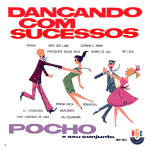 Pocho E Seu Conjunto "Dancando Com Sucessos" (RGE, 1960) (LP)
Pocho E Seu Conjunto "Dancando Com Sucessos" (RGE, 1960) (LP)
Kitschy, Latin-flavored pop-dance-easy listening tunes from Rubens Perez, an Uruguayan bandleader who started working in Brazil during the late 1950s. Lots of instrumentals with plinky piano, and vocal songs sung in both Spanish and Portuguese... The bossa nova influence can be heard on several songs, ranging from straightforward pop-bossa songs such as Tito Madi's "Carinho E Amor" to novelty numbers like "Presidente Bossa Nova." Mostly pretty lightweight material -- not much that really sticks to the ribs, but kitsch fans might dig it.
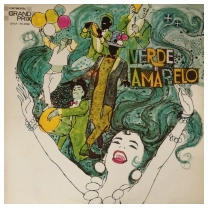 Pocho (Perez) & Trio Pagao "Verde E Amarela: Green And Yellow" (Continental, 1970)
Pocho (Perez) & Trio Pagao "Verde E Amarela: Green And Yellow" (Continental, 1970)
An awesome slice of tourist-album kitsch! Pocho Perez conducts both a large orchestral band and the smaller Trio Pagao, along with an anonymous crew of samba school musicians in a come-see-Brazil booster album, co-produced with the VARIG airline. Side One on the LP includes two long tracks with English-language narration giving an overview of Brazil's musical heritage, as narrated by "the Samba," a character voiced by Rodrigo de Moraes, and written by Humberto Marcal. As "the Samba" discusses various instruments (cuicas, agogos, whatever) the musicians highlight whatever's being discussed, and on the second track, "the Samba" gives an overview of dozens of musical styles, such as the baiao, maxixe and marcas, with examples that are sometimes so sweetened by the modern orchestrations it's hard to differentiate them from one another. The narration is priceless, with declamations regarding Brazil's year-round sunshine, it's happy people, and wonderful coffee... you get the picture. At the same time, it's a good primer on the music, even if it's hard not to see this as a completely, deliciously corny album. (My favorite line comes when the Bossa Nova is described as the "snobby" younger brother of the Samba...) Side Two is an all-instrumental series of medleys by Pocho's orchestra -- brisk, breezy renditions of music from a variety of composers, including songs by Tom Jobim and Caetano Veloso, along with a lot of older samba-cancao classics. Sadly, my copy does not also still include the VARIG travel brochure that was stuffed into a small pocket cut into the LP jacket.
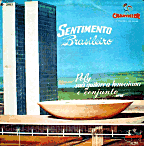 Poly Sua Guitarra Hawaiana E Conjunto "Sentimento Brasileiro" (Chantacler, 1961)
Poly Sua Guitarra Hawaiana E Conjunto "Sentimento Brasileiro" (Chantacler, 1961)
Fascinating! I mean, wow... a vintage album that combines two of my favorite genres, old-school samba and classic Hawaiian music?? I am so totally there! Apparently "Poly" was a stage name for a guitarist named Angelo Apolonio who had mastered the Hawaiian steel guitar, and found a way to fit it in the older samba-pop orchestrations. The modest backing band here seems a little less into it than Poly does, but the results are still super-cool, with slide guitar passages that bend to Brazilian melodies rather than the songs of the seas. Particularly cool is how the rhythmic backing by stringed instruments (the ukulele in Hawaiian music, the cavaquinho in Brazil) sounds so similar in both styles, and forms a bridge between the two. A great instrumental music keepsake, with several tracks that stand the test of time.
 Poly And His Hawaiian Ensemble "Hawaiian Sunset" (Columbia Harmony)
Poly And His Hawaiian Ensemble "Hawaiian Sunset" (Columbia Harmony)
Not sure of the vintage or the provenance, but I'm assuming that this is the same Brazilian steel player named "Poly" listed above. This is mellower, more strictly Hawaiian and pretty much devoid of the samba influence of his earlier(?) work... In fact, it's a little snoozy, to be honest, with a dreary organ and a sleepy xylophone that do little to invigorate Poly's steel work. Not nearly as fun as the other stuff I've heard.
Poly & Waldir Azevedo "Dose Dupla" (1997)
This CD reissue includes two separate albums by the steel guitar player nicknamed Poly and mandolin whiz, Waldir Azevedo. I'm not sure which two albums they are, though...
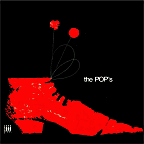 The Pop's "Na Base Do Ie, Ie, Ie" (Equipe, 1966) (LP)
The Pop's "Na Base Do Ie, Ie, Ie" (Equipe, 1966) (LP)
(Produced by Oswaldo Cadaxo & Tony Vestane)
Mostly a collection of surfy/Shadows-y rock/pop guitar instrumentals, with a pair of jovem guarda pop ballads ("Solidao," "Inspiracao") bookending the twang tunes. Surf music devotees will want to track this down, for sure -- this was a good band, worth knowing about -- but if you're primarily interested in Brazilian rock music, music that sounds distinctly Brazilian, this is mostly stuff that you can hear bands anywhere in the world play. "Solidao" is a nice sappy JG song, but that's about it. Stay tuned, though: despite the unneeded apostrophe, The Pop's evolved into a much more interesting band.
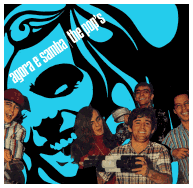 The Pop's "Agora E Samba" (Equipe, 1968) (LP)
The Pop's "Agora E Samba" (Equipe, 1968) (LP)
A wildly kinetic "easy listening" album, blending uptempo samba drumming with inventive, jazzy electric guitar and a particularly manic organist -- sort of like Walter Wanderley on crack. I have to admit, this album got on my nerves after a while, but there are plenty of great performances and catchy grooves on here. For fans of instrumental novelty pop, this record'd be a real find... A groovy intersection between youthful samba-soul, goofy muzak and hardcore batucada percussion. Who knew?
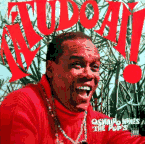 The Pop's & Oswaldo Nunes "Ta Tudo Ai" (Equipe, 1969) (LP)
The Pop's & Oswaldo Nunes "Ta Tudo Ai" (Equipe, 1969) (LP)
A groovy set, wherein the rock chops of the punctuation-challenged Pop's are harnessed to the swinging multi-stylistic tornado of singer Oswaldo Nunes, an energetic, expressive performer who apparently died young, but recorded some truly fab material, including this intriguing album. Like Jair Rodrigues or Wilson Simonal before him, Nunes could be alternately explosive and schmaltzy; I enjoyed him in both modes. There are plenty of regional touches, including an undercurrent of forro and baiao, as well as old-school samba; hearing the crunchy, fuzzy electric guitars in the mix is a gas, and although the Pop's sound a little less committed to their chores as backup vocalists, this is a great record, one that'll get you up and dancing before you know what hit you. Definitely worth tracking down!
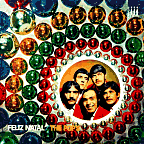 The Pop's "Feliz Natal" (Equipe, 1969) (LP)
The Pop's "Feliz Natal" (Equipe, 1969) (LP)
(Produced by Oswaldo Cadaxo)
A surfy holiday rock-instrumental album, with plenty of standards ("White Christmas," etc.) and some homegrown South American tunes as well. This is mildly groovy, but not distinctively "Brazilian" in any way -- any number of prefab rock bands up North could have cranked this out as well. Great version of "Jingle Bells," though!
 Portastatic "De Mel, De Melao" (Merge Records, 2000)
Portastatic "De Mel, De Melao" (Merge Records, 2000)
(Produced by Mac McCaughan & Brian Paulson)
This isn't really from Brazil, but don't let that stop you...! It seems that Merge Record's main man, indie-rock god Mac McCaughy, has been on a big Brazilian kick for a while and, after taking a trip down south, finally worked up the gumption to put out a tribute disc. This five-song EP is great: I'd love to hear a full-length follow up, maybe with some tropicalia-inspired original material as well as the classics... As it is, though, this is pretty engaging, with freshly translated versions of oldies by Caetano Veloso, Gilberto Gil, and other tropicalia legends, along with a nice ballad from bossa-jazz chanteuse, Joyce. These are heartfelt, sonically rich and musically perceptive. Check it out!
 Portinho "Noel Rosa & Portinho Da Samba" (Philips, 1964) (LP)
Portinho "Noel Rosa & Portinho Da Samba" (Philips, 1964) (LP)
Brassy big band/orchestral versions of Noel Rosa catchy samba-cancao classics. It's a very jaunty little record, very corny, too, but also pretty listenable. I guess I'd class this as a guilty pleasure -- I'd be a little embarrassed to have friends catch me listening to it, but it's got a kooky, kitschy groove, nonetheless.
 Eladyr Porto "Tangos Em Versao" (Mocambo, 1955) (LP)
Eladyr Porto "Tangos Em Versao" (Mocambo, 1955) (LP)
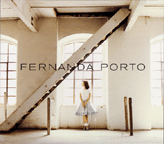 Fernanda Porto "Fernanda Porto" (Trama Records, 2003)
Fernanda Porto "Fernanda Porto" (Trama Records, 2003)
She's been hailed as Brazil's best electronic-pop diva, but frankly, I found this disc to be a bit generic and un-adventuresome. It's okay -- sort of similar to Bebel Gilberto's Tanto Tempo album, though less inventive and more aggressively "pop" -- but it didn't really wow me. The electronica aspects are too uni-dimensional -- a dip into this or that readily-identifiable dance style, blips, boops and beats, drum'n'bass grooves that have been heard a bazillion times before, and little aural texture to help flesh them out. This is probably best taken in small doses, with a song here and there mixed in with other artists... For about half the record, it's innocuous an easy on the ears... And then after a while the unvarying perkiness starts to wear thin. Please note, I'm fairly critical of dance music and electronica in general, and for those of you who are in a more clubby frame of mind, this album will probably sound completely brilliant and fresh. Take what I say with a grain of salt.
Fernanda Porto "Ao Vivo" (Trama Records, 2006)
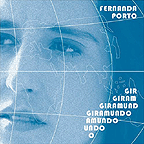 Fernanda Porto "Giramundo" (Trama Records/Circular Moves, 2006)
Fernanda Porto "Giramundo" (Trama Records/Circular Moves, 2006)
(Produced by Fernanda Porto)
Can't say I'm really loving this new, self-produced record by up-and-coming Brazilian electronica diva Fernanda Porto... There's a rushed, careless feel about the album that, I suppose, is a reflection of the club-oriented "baile funk" scene, which prizes high-energy exuberance above all else. I think Porto would have been better off exploring the silky, multi-textured electronic/ambient style of her previous album, but who knows? Maybe that sort of subtlety and sultriness is too "tired" these days, amid the coolness-obsessed, hip, happening young-uns. All I know is that rapid-fire club music like this doesn't do much for me, nor does it support Porto's modest voice as well as her more relaxed, thoughtful arrangements. You might wanna check it out for yourself, though -- maybe I'm just too old and geezerly to get what she's doing.
Fernanda Porto "Auto Retrato" (EMI, 2009)
Fernanda Porto "The Best Of Fernanda Porto" (Trama Records/Circular Moves, 2006)
Zizi Possi - see artist discography
Baden Powell - see artist discography
Louis Marcel Powell "Samba Novo" (JVC-Japan, 2002)
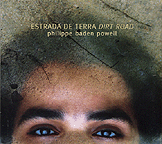 Philippe Baden Powell "Estrada De Terra (Dirt Road)" (Adventure Music, 2006)
Philippe Baden Powell "Estrada De Terra (Dirt Road)" (Adventure Music, 2006)
The son of famed bossa nova guitarist Baden Powell, Brazilian pianist Phillipe Baden Powell is more or less a straight jazz player -- this is a fast, forceful set that largely eschews the subtlety of his father's work. But it also establishes an energetic newcomer that jazz fans may look forward to hearing more of in years to come. Not my cup of tea (not "Brazilian" enough), but others may dig it...
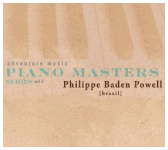 Philippe Baden Powell "Piano Masters, Volume Two" (Adventure Music, 2012)
Philippe Baden Powell "Piano Masters, Volume Two" (Adventure Music, 2012)
(Produced by Jim Luce & Richard Zirinsky, Jr.)
Sparse, meditative Brazilian jazz piano explorations from Philippe Baden Powell, son of the legendary guitarist Baden Powell. The repertoire includes several of his original pieces alongside MPB standards by composers such as Edu Lobo and Caetano Veloso, as well as jazz standards such as Thelonious Monk's "Round About Midnight" and John Coltrane's "Giant Steps." What I found interesting about this album was how it took such modern material and recast it to echo the improvisational elements of the choro style, subtly recalling the Brazilian proto-jazz of the 1920s, albeit in a slowed-down, contemplative style. Certainly worth checking out for contemporary jazz fans.
Carlos Poyares - see artist discography
 Praiao E Prainha "Dois Amores E Um Segredo" (Chantecler, 1968) (LP)
Praiao E Prainha "Dois Amores E Um Segredo" (Chantecler, 1968) (LP)
While the hippies and rockers and college students in Sao Paulo and Rio were plugging in and turning on, out in the hinterlands, the locals were chugging along, playing decidedly un-hip regional music. Praiao and Prainha were a brother-act duo from Uberlandia, the second-largest city in Mina Gerais... Despite their relatively urban roots, their music was decidedly rural, and even a bit "foreign" to the Brazilian spectrum, including styles such as polkas, valsas, corridos and rancheras that had a distinctly Mexican feel (though also sharing a lot in common with rural regional artists in neighboring nations such as Bolivia and Chile). There are also a few tunes labeled as guarania, rasqueado and even one samba tune, though it's hard to differentiate them from the rest of the material. At any rate, the brothers -- Aguimar Fernandes Balieiro (aka Praiao) and Ademar Fernandes Balieiro (Prainha) -- gained considerable popularity with a nice, uncomplicated sound and tight, brother-sound harmonies. This album features very barebones musical backing -- accordion, bass and guitar, and little else -- though other records sometimes incorporated a wider range of instruments. The album has an admittedly static feel, though still feels emotionally rich; only occasionally does one of the brothers depart from the high, nasal harmonies and present a richer, lower vocal tone; one wonders what they might have sounded like had they strayed a little farther from the confines of the ranchero genre.
Praiao E Prainha "So Resta Saudade" (Chantecler, 1968) (LP)
 Praiao E Prainha "Morena De Mato Grosso" (California, 19--?) (LP)
Praiao E Prainha "Morena De Mato Grosso" (California, 19--?) (LP)
(Produced by Mario Vieira)
Another nice album, with a slightly larger musical palette (perhaps implied in the title track's reference to neighboring Mato Grosso...) The opening song, "Morena De Mato Grosso," includes a bouncy Andean harp, which pops up on several other tracks, though as on their other records the accordion and guitar predominate. Stylistically this disc includes genres such as the arrasta-pe, caterete, guarania, rancheiras, valsa, and son huasteco, and overall I'd say this album has richer tonality and more sonic depth than the album reviewed above. I'm not sure which one came first, or indeed how many albums Praiao e Prainha recorded over their career: they were popular enough, though, than several "best-of" collections were made, including a few in the CD era. Nice stuff, actually. Also of interest is the label, Discos Musicais California, apparently a short-lived imprint from Sao Paulo that specialized in regional music... I have a few of their LPs, but don't know the full scope of the label's catalog.
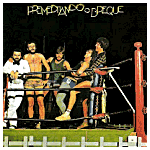 Premeditando O Breque "Preme" (Spalla, 1981) (LP)
Premeditando O Breque "Preme" (Spalla, 1981) (LP)
This kooky, eclectic Sao Paulo band came out of the intellectual, university-educated wing of the late-1970s MPB scene. Playing in a variety of historical and regional styles, they mixed satire and scholarship with a playful, chaotic spirit... Perhaps they aspired to be sort of a Brazilian Bonzo Dog Doo-Dah Band? Obviously, I don't get most of the references, but the humor-filled feel of the band is easy to pick up on... This was their first album, and featured a lot of acoustic musicianship -- they'd get a bigger, poppier sound as time went on.
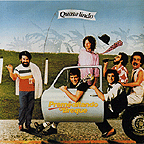 Premeditando O Breque "Quase Lindo" (Continental/Devil Discos, 1983) (LP)
Premeditando O Breque "Quase Lindo" (Continental/Devil Discos, 1983) (LP)
A wildly eclectic band hones their craft within a too-smooth pop production style... While it's obvious that they are (partly) playing for laughs, the slick pop sound is a jarring contrast to their anarchic spirit. The album opens with the swank, big-bandy "Sao Paulo, Sao Paulo," a Tony Bennett-esque Brazilianization of the "New York, New York" theme; the rest of the record runs through a variety of genres, but all with the same clean, round-toned studio sound -- which is itself partly what they make fun of. Kind of a weird record, not quite my cup of tea, but worth checking out if you're interested in hearing Brazilian stuff that's off the beaten track.
Premeditando O Breque "O Melhor Dos Iguais" (1985)
Premeditando O Breque "Grande Coisa" (1986) (LP)
Premeditando O Breque "Alegria Dos Homens" (1991)
Premeditando O Breque "Vivo" (Velas, 1996)
 Tito Puente "Bossa Nova By Puente" (Tico, 1962) (LP)
Tito Puente "Bossa Nova By Puente" (Tico, 1962) (LP)
(Produced by Teddy Reig)
At some point, nuyoriquan superstar bandleader Tito Puente got into the bossa nova craze as well... The repertoire includes some genuine Brazilian bossa hits from Tom Jobim, et. al., songs such as "One Note Samba," "Desafinado," "O Pato" and "Meditacao" as well as a bunch of "bossa"-themed Latin/novelty numbers such as "Loco Bossa Nova," "Bossa Nova A La Puente" and Latin-ized versions of "Little Brown Boy" and "Come To The Mardi Gras." Predictably, everything goes through the Puente/Tico Latin dance mill, and a lot of the "Brazilian-ness" gets lost in the mix, but it's still fun stuff. It's kitschy, and not the best thing Puente ever recorded, but it's also very much of its time... And in some ways, Puente's schmaltzy big-band approach is similar to that of Brazilian bandleaders such as Severino Araujo, so there is some legitimate common ground. Certainly worth a spin.
Flora Purim - see artist discography
 Luiz Arruda Paes "Brasil Noite E Dia" (Odeon, 1957) (LP)
Luiz Arruda Paes "Brasil Noite E Dia" (Odeon, 1957) (LP)
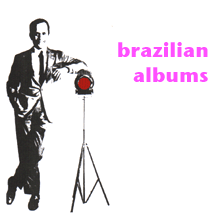
 Roberto Paiva & Francisco Egydio "Polemica Noel Rosa & Wilson Baptista" (Odeon, 1956) (LP)
Roberto Paiva & Francisco Egydio "Polemica Noel Rosa & Wilson Baptista" (Odeon, 1956) (LP)
 Roberto Paiva/Luiz Bonfa/Vinicius De Moraes "Musicas De Orfeu Da Conceicao" (Odeon, 1956) (LP)
Roberto Paiva/Luiz Bonfa/Vinicius De Moraes "Musicas De Orfeu Da Conceicao" (Odeon, 1956) (LP)
 Pale Sunday "Summertime...?" (Matinee Records, 2005)
Pale Sunday "Summertime...?" (Matinee Records, 2005)
 The Pan American Orchestra "Big Band Big Voices Bossa Nova" (Musidisc, 1963) (LP)
The Pan American Orchestra "Big Band Big Voices Bossa Nova" (Musidisc, 1963) (LP)
 Pao Com Manteiga "Pao Com Manteiga" (Continental, 1976) (LP)
Pao Com Manteiga "Pao Com Manteiga" (Continental, 1976) (LP)
 Ione Papas "Noel Por Ione" (Dabliu, 2000)
Ione Papas "Noel Por Ione" (Dabliu, 2000)
 Joao Parahyba "Kyzumba" (YB, 1994)
Joao Parahyba "Kyzumba" (YB, 1994)
 Argemiro Patrocinio "Argemiro Patrocinio" (EMI/Phonomotor, 2002)
Argemiro Patrocinio "Argemiro Patrocinio" (EMI/Phonomotor, 2002)
 Pau Brasil "Babel" (Blue Jackel Records, 1995)
Pau Brasil "Babel" (Blue Jackel Records, 1995)
 Paulinho E Sua Bateria "Paulinho Baterista - Batucada" (Philips, 1961) (LP)
Paulinho E Sua Bateria "Paulinho Baterista - Batucada" (Philips, 1961) (LP)
 Paulinho & Seu Conjunto "Para Animar Sua Festa" (Prestige, 1959) (LP)
Paulinho & Seu Conjunto "Para Animar Sua Festa" (Prestige, 1959) (LP)
 Pedro Paulo "Apresenta Os Sucessos" (Columbia/OKeh, 1969) (LP)
Pedro Paulo "Apresenta Os Sucessos" (Columbia/OKeh, 1969) (LP)
 Pe De Boi "Power Samba Band" (Arkadia, 1998)
Pe De Boi "Power Samba Band" (Arkadia, 1998)
 Moacyr Peixoto "Pra Balancar" (Philips, 1964) (LP)
Moacyr Peixoto "Pra Balancar" (Philips, 1964) (LP)
 Leo Peracchi E Sua Orquestra "Brazilian Cocktails" (Capitol, 1958) (LP)
Leo Peracchi E Sua Orquestra "Brazilian Cocktails" (Capitol, 1958) (LP)
 Marco Pereira & Cristovao Bastos "Bons Encontros" (Caju/Milestone Records, 1992)
Marco Pereira & Cristovao Bastos "Bons Encontros" (Caju/Milestone Records, 1992)
 Pereirinha E Sua Gente "Sao Joao De Outrora" (Equipe, 1967)
Pereirinha E Sua Gente "Sao Joao De Outrora" (Equipe, 1967)
 Perfume Azul Do Sol "Nascimento" (Chantecler, 1974)
Perfume Azul Do Sol "Nascimento" (Chantecler, 1974)
 Perla "Maxximum" (Sony, 2005)
Perla "Maxximum" (Sony, 2005)
 Pernambuco & Seu Conjunto "Em Ritmo De Danca" (Polydor, 1957) (LP)
Pernambuco & Seu Conjunto "Em Ritmo De Danca" (Polydor, 1957) (LP)
 Luciano Perrone "Batucada Fantastica" (Musidisc, 1963) (LP)
Luciano Perrone "Batucada Fantastica" (Musidisc, 1963) (LP)
 Persona "Som" (1975)
Persona "Som" (1975)
 Pifanos De Caruaru "A Bandinha Vai Tocar" (Discos Marcus Pereira, 1980) (LP)
Pifanos De Caruaru "A Bandinha Vai Tocar" (Discos Marcus Pereira, 1980) (LP)
 Os Pilantrocratas "Pilantrocracia" (Equipe, 1969) (LP)
Os Pilantrocratas "Pilantrocracia" (Equipe, 1969) (LP)
 Pinduca "20 Super Sucessos" (Polydisc, 1999)
Pinduca "20 Super Sucessos" (Polydisc, 1999)
 Tiago Pinheiro "Tiago Pinheiro" (Dabliu, 1999)
Tiago Pinheiro "Tiago Pinheiro" (Dabliu, 1999)
 Irany Pinto "Sambas Em Surdina" (EMI-Odeon, 1959) (LP)
Irany Pinto "Sambas Em Surdina" (EMI-Odeon, 1959) (LP)
 Rossini Pinto "Rossini Pinto" (CBS, 1964) (LP)
Rossini Pinto "Rossini Pinto" (CBS, 1964) (LP)
 Carlos Piper "Cole Porter Bossa Nova" (Philips, 1963) (LP)
Carlos Piper "Cole Porter Bossa Nova" (Philips, 1963) (LP)
 Carlos Piper "+18" (Chantacler, 1973) (LP)
Carlos Piper "+18" (Chantacler, 1973) (LP)
 Piraja Esquina Carioca "Uma Noite Com A Raiz Do Samba 0 Ao Vivo" (Dabliu, 2000)
Piraja Esquina Carioca "Uma Noite Com A Raiz Do Samba 0 Ao Vivo" (Dabliu, 2000)
 Alexandre Pires "Alexandre Pires" (BMG/RCA, 2001)
Alexandre Pires "Alexandre Pires" (BMG/RCA, 2001)
 Mylene Pires "Mylene" (Fast Horse Records, 2003)
Mylene Pires "Mylene" (Fast Horse Records, 2003)
 Piri "Voces Querem Mate?" (Quartin 1970) (LP)
Piri "Voces Querem Mate?" (Quartin 1970) (LP)
 Carlos Pita "Aguas Do Sao Francisco" (Chantacler, 1979) (LP)
Carlos Pita "Aguas Do Sao Francisco" (Chantacler, 1979) (LP)
 Pocho E Seu Conjunto "Dancando Com Sucessos" (RGE, 1960) (LP)
Pocho E Seu Conjunto "Dancando Com Sucessos" (RGE, 1960) (LP)
 Pocho (Perez) & Trio Pagao "Verde E Amarela: Green And Yellow" (Continental, 1970)
Pocho (Perez) & Trio Pagao "Verde E Amarela: Green And Yellow" (Continental, 1970)
 Poly Sua Guitarra Hawaiana E Conjunto "Sentimento Brasileiro" (Chantacler, 1961)
Poly Sua Guitarra Hawaiana E Conjunto "Sentimento Brasileiro" (Chantacler, 1961)
 The Pop's "Na Base Do Ie, Ie, Ie" (Equipe, 1966) (LP)
The Pop's "Na Base Do Ie, Ie, Ie" (Equipe, 1966) (LP)
 The Pop's "Agora E Samba" (Equipe, 1968) (LP)
The Pop's "Agora E Samba" (Equipe, 1968) (LP)
 The Pop's & Oswaldo Nunes "Ta Tudo Ai" (Equipe, 1969) (LP)
The Pop's & Oswaldo Nunes "Ta Tudo Ai" (Equipe, 1969) (LP)
 The Pop's "Feliz Natal" (Equipe, 1969) (LP)
The Pop's "Feliz Natal" (Equipe, 1969) (LP)
 Portastatic "De Mel, De Melao" (Merge Records, 2000)
Portastatic "De Mel, De Melao" (Merge Records, 2000)
 Fernanda Porto "Fernanda Porto" (Trama Records, 2003)
Fernanda Porto "Fernanda Porto" (Trama Records, 2003)
 Fernanda Porto "Giramundo" (Trama Records/Circular Moves, 2006)
Fernanda Porto "Giramundo" (Trama Records/Circular Moves, 2006)
 Philippe Baden Powell "Estrada De Terra (Dirt Road)" (Adventure Music, 2006)
Philippe Baden Powell "Estrada De Terra (Dirt Road)" (Adventure Music, 2006)
 Philippe Baden Powell "Piano Masters, Volume Two" (Adventure Music, 2012)
Philippe Baden Powell "Piano Masters, Volume Two" (Adventure Music, 2012)
 Premeditando O Breque "Preme" (Spalla, 1981) (LP)
Premeditando O Breque "Preme" (Spalla, 1981) (LP)
 Premeditando O Breque "Quase Lindo" (Continental/Devil Discos, 1983) (LP)
Premeditando O Breque "Quase Lindo" (Continental/Devil Discos, 1983) (LP)


